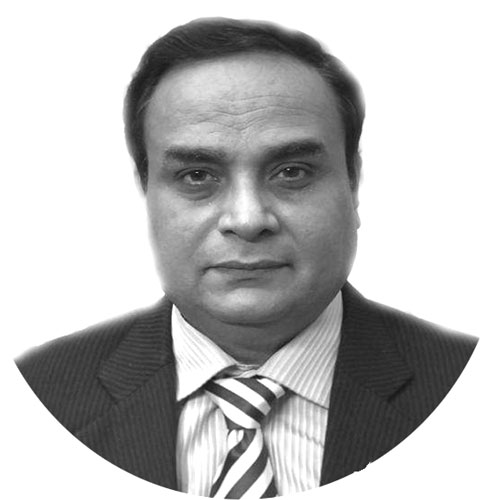Dr Mehmood-ul-Hassan Khan
CONCEPT of political succession has had been rigorously discussed in all the ancient political philosophies. It is derived from the Plato’s famous “Five Regimes” covering all forms of governance and highlighting importance of a “functional” and “systematic” political succession in the “state” apparatus. Aristotle’s “The Constitution” also clarified and upheld real “essence” of political succession for the “easy” and “smooth” functioning of the government. Most recently, Sultan of Oman, H.E. Haitham bin Tariq Al-Said promulgated a series of decrees and introduced a “holy concept” of “political succession” in the basic law of the land and nominated Crown Prince of the country. Subsequently, Oman’s Sultan has named his son as Crown Prince.
Even prominent political scientist Peter Calvert stressed the need to “institutionalize” a system of political succession to remove “conflicting” realities of inter & intra conflicts, race of power, political instability, chaos, constitutional deadlock and last but not the least, societal disintegration. Sultan Haitham bin Tariq Al-Said of Oman introduced major but befitting changes in the country’s constitution which has interrelated socio-economic, geopolitical and geostrategic multiplier effects. It is indeed a giant step towards greater political stability, economic sustainability and social cohesion.
Divergent forces in the State should be streamlined to achieve the desired goals of stability and survival. Perpetual political instability, sever economic malaise, ethnic division and social disharmony has been hallmarks of most of the Sub-Saharan Africa in the past due to which states have been under siege of armed militia and various pressure groups. Previously, the appointment of sultans was executed on consensus of the royal family or the wishes of the current sultan, rather than a father-to-son succession, as is the case in many other Gulf States. According to new Constitution amendments, Article-5 of the Basic Law means that the “system of governance is hereditary in the male descendants of Sultan Turki bin Said bin Sultan.
It clearly outlines the “operationalization” of various modes of political system and of course holistic governance. According to new changes the power transfers from the Sultan to his first-born son and then to his eldest son and consequently the power transfers to one stratum after another. In case the Sultan’s elder son dies before assuming power, the succession should be transferred to his elder son even if the deceased has brothers,” the new law states. Moreover, if the first in line for succession has no sons, then “rule automatically shifts to his elder brother”.
It will promote new “dynamic” and “vibrant” political culture in Oman. It will create a “strategic cushion” against all conspiracies, conflicts, and contradictions among the different organs of the state as well as main stakeholders. On his promulgation, Sultan Haitham assured that the new constitutional changes will guarantee a specific and stable mechanism for the succession process. For the further strengthening of state’s functions, utilities and maturity of the political system a “Royal Family Council (RFC) will also be formed in which formulation, specialization and member priority of will be determined by a Royal Decree.
The law also clearly guarantees “the maintenance of the state’s independence and sovereignty”, indicating that Oman will continue the policy of neutrality in foreign affairs established under Sultan Qaboos. Being a prominent regional expert of GCC & MENA, I term the current constitutional changes as important and unprecedented which will change the country’s modern history. Moreover, establishment of the position of Crown Prince will promote new political culture in the country. Sultan Haitham bin Tariq is a great reformer and introduced drastic changes to improve governance, streamline modalities of development to take the country to a new height. The series of diversified but integrated structural reforms mainly, nullification of some laws, restructuring of some ministries and creation of others and ministerial amendments including the foreign and financial ministries have been implemented in the country.
Furthermore, the current changes in the Basic Law of the State, outlining a specific and stable mechanism for the transfer of power in the Sultanate and the establishment of a mechanism for the appointment of the Crown Prince, clarification of his duties and powers will transform Oman’s politic, civility, society, economic policies and establish a spirit of good governance, smart government and smart society in the country. In this context, the issuance of a decree that introduces new rules of the Council of Oman consisting of two chambers includes an appointed Council of State and an elected Consultative Council will jointly work for achieving desired goals of greater political stability, socio-economic prosperity and protection of sovereignty and territorial integrity of Oman.
Western civilization has been greatly inspired to many continents in the evolution of human survival and political orientations. Western civilization and journey of politicization and democratization has matured the holy concepts of distribution of power and political succession which may be replicated in the different political systems in a, appropriate manner matching to indigenous culture, traditions, civilization and norms. To conclude series of substantial decrees and radical changes most recently incorporated in the constitutional amendments will reinforce important concepts, such as transparency, accountability, justice and push for the materialization of Oman’s vision 2040.
—The writer is Director, Geopolitics/Economics Member Board of Experts, CGSS.










